Legal Issues for Accountants: University of Melbourne, Semester 2 2019
VerifiedAdded on 2022/10/19
|12
|3340
|351
Homework Assignment
AI Summary
This assignment addresses legal issues relevant to accountants, focusing on a case study involving a student's enrollment in a university program and the potential legal recourse available to the student. The solution explores the application of Australian Consumer Law, contract law, and the concept of unfair contracts. It examines the rights of consumers in relation to educational institutions, including issues of misrepresentation and the doctrine of promissory estoppel. The analysis considers whether the university's actions constitute a breach of contract or negligence. The solution also addresses a scenario involving tuition fees and whether the fee amount impacts the legal arguments. The assignment delves into the legal rights and protections afforded to students as consumers of educational services and the implications of contract terms within the context of higher education. It provides a comprehensive legal analysis, supported by case law, to determine the student's rights and potential remedies.
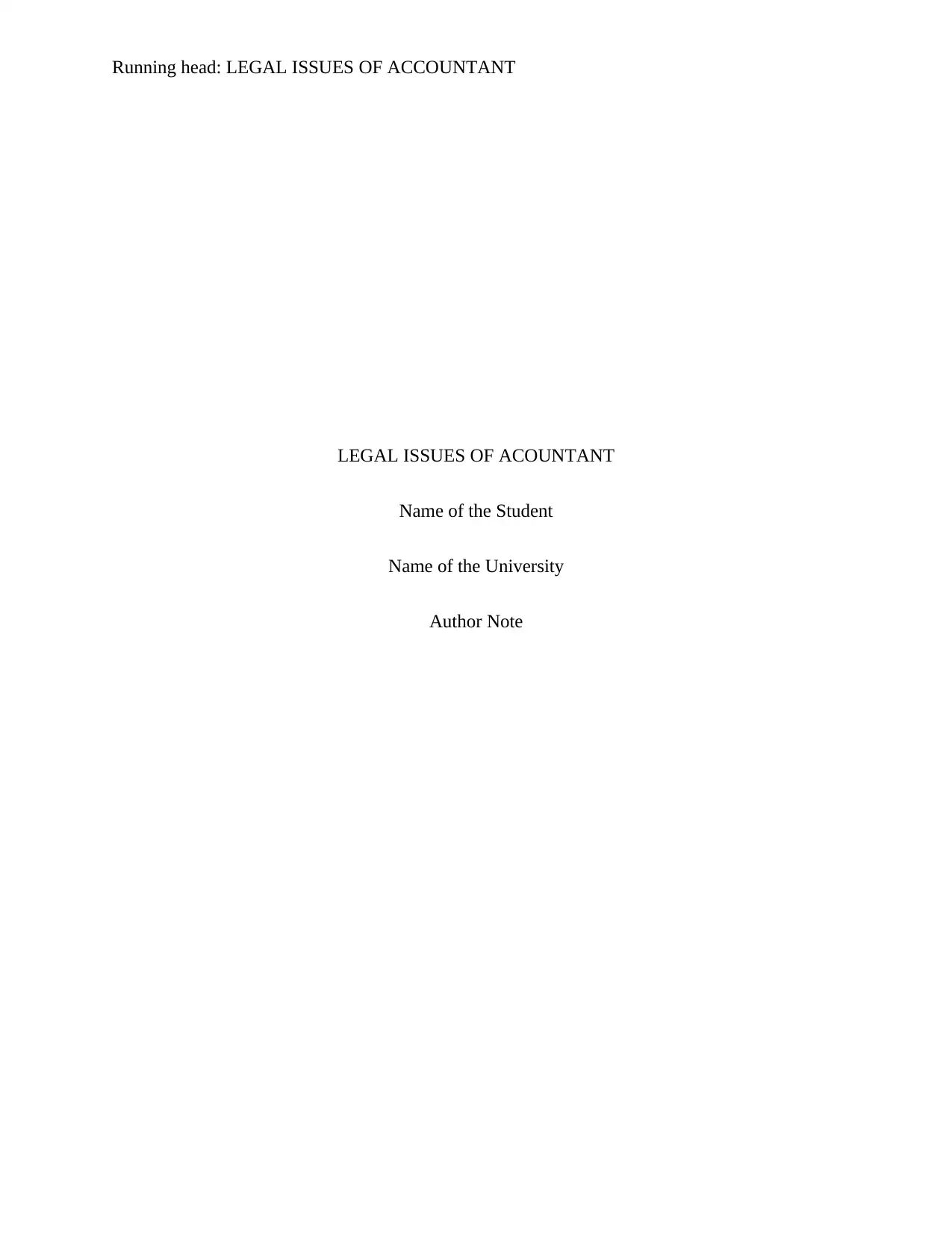
Running head: LEGAL ISSUES OF ACCOUNTANT
LEGAL ISSUES OF ACOUNTANT
Name of the Student
Name of the University
Author Note
LEGAL ISSUES OF ACOUNTANT
Name of the Student
Name of the University
Author Note
Paraphrase This Document
Need a fresh take? Get an instant paraphrase of this document with our AI Paraphraser
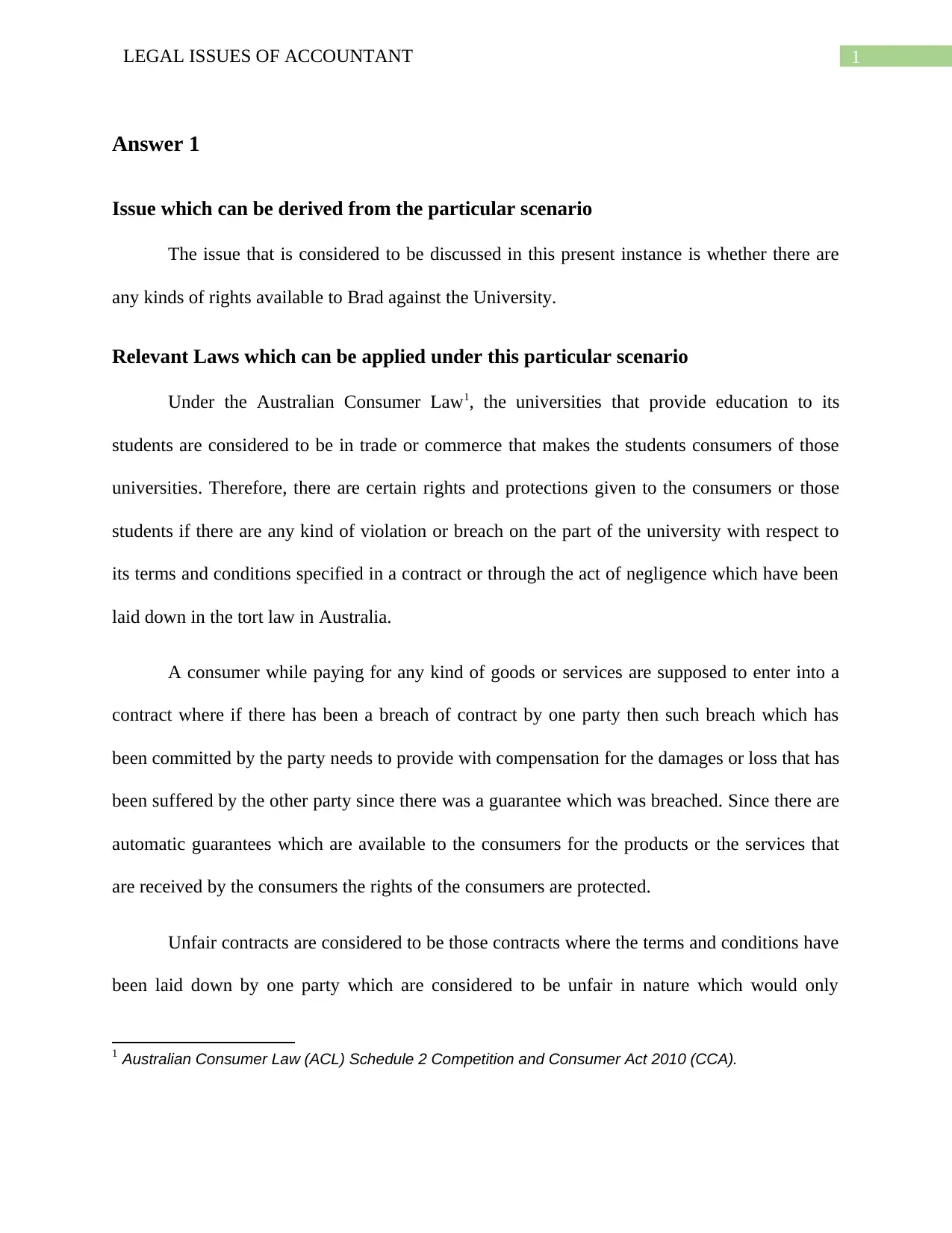
1LEGAL ISSUES OF ACCOUNTANT
Answer 1
Issue which can be derived from the particular scenario
The issue that is considered to be discussed in this present instance is whether there are
any kinds of rights available to Brad against the University.
Relevant Laws which can be applied under this particular scenario
Under the Australian Consumer Law1, the universities that provide education to its
students are considered to be in trade or commerce that makes the students consumers of those
universities. Therefore, there are certain rights and protections given to the consumers or those
students if there are any kind of violation or breach on the part of the university with respect to
its terms and conditions specified in a contract or through the act of negligence which have been
laid down in the tort law in Australia.
A consumer while paying for any kind of goods or services are supposed to enter into a
contract where if there has been a breach of contract by one party then such breach which has
been committed by the party needs to provide with compensation for the damages or loss that has
been suffered by the other party since there was a guarantee which was breached. Since there are
automatic guarantees which are available to the consumers for the products or the services that
are received by the consumers the rights of the consumers are protected.
Unfair contracts are considered to be those contracts where the terms and conditions have
been laid down by one party which are considered to be unfair in nature which would only
1 Australian Consumer Law (ACL) Schedule 2 Competition and Consumer Act 2010 (CCA).
Answer 1
Issue which can be derived from the particular scenario
The issue that is considered to be discussed in this present instance is whether there are
any kinds of rights available to Brad against the University.
Relevant Laws which can be applied under this particular scenario
Under the Australian Consumer Law1, the universities that provide education to its
students are considered to be in trade or commerce that makes the students consumers of those
universities. Therefore, there are certain rights and protections given to the consumers or those
students if there are any kind of violation or breach on the part of the university with respect to
its terms and conditions specified in a contract or through the act of negligence which have been
laid down in the tort law in Australia.
A consumer while paying for any kind of goods or services are supposed to enter into a
contract where if there has been a breach of contract by one party then such breach which has
been committed by the party needs to provide with compensation for the damages or loss that has
been suffered by the other party since there was a guarantee which was breached. Since there are
automatic guarantees which are available to the consumers for the products or the services that
are received by the consumers the rights of the consumers are protected.
Unfair contracts are considered to be those contracts where the terms and conditions have
been laid down by one party which are considered to be unfair in nature which would only
1 Australian Consumer Law (ACL) Schedule 2 Competition and Consumer Act 2010 (CCA).
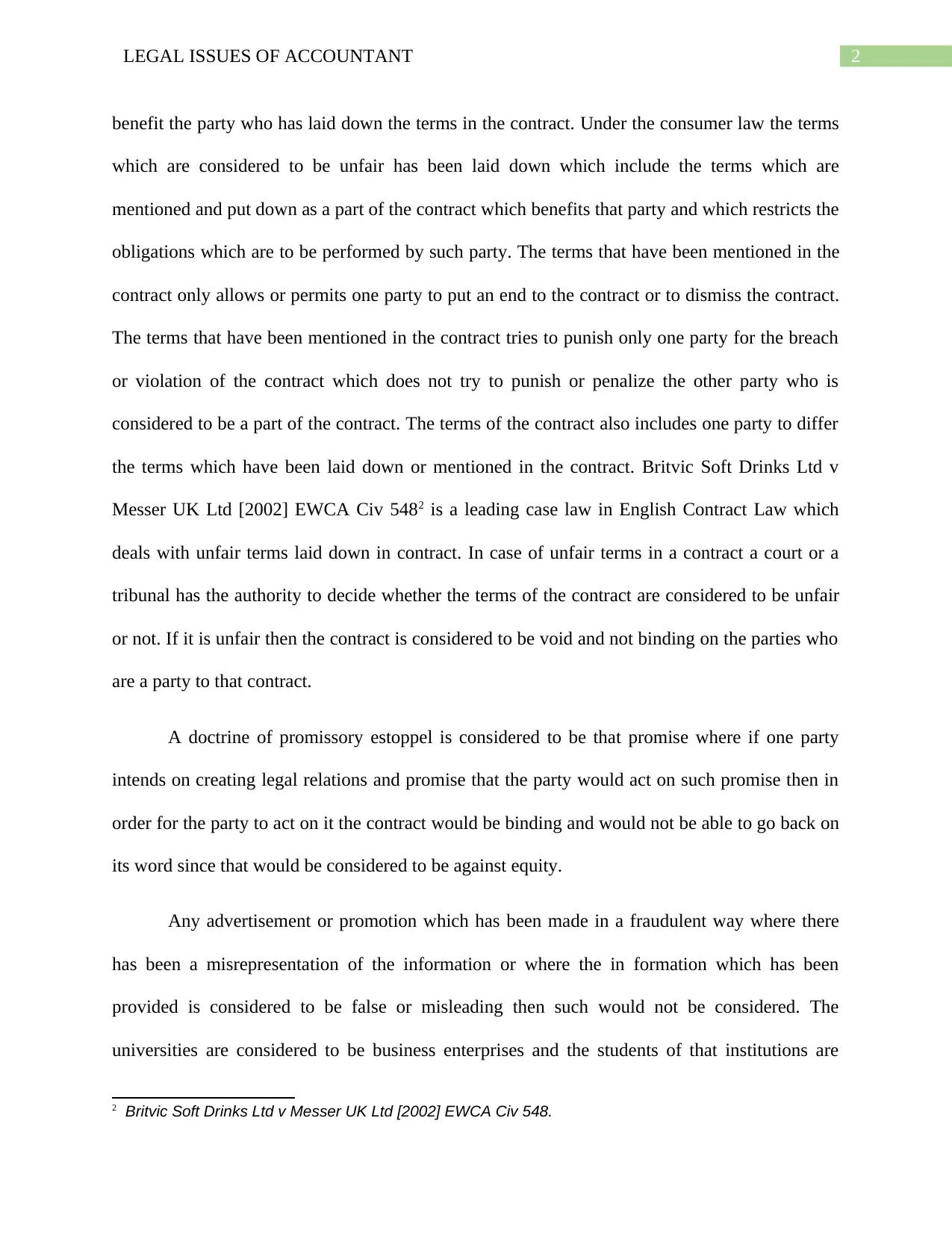
2LEGAL ISSUES OF ACCOUNTANT
benefit the party who has laid down the terms in the contract. Under the consumer law the terms
which are considered to be unfair has been laid down which include the terms which are
mentioned and put down as a part of the contract which benefits that party and which restricts the
obligations which are to be performed by such party. The terms that have been mentioned in the
contract only allows or permits one party to put an end to the contract or to dismiss the contract.
The terms that have been mentioned in the contract tries to punish only one party for the breach
or violation of the contract which does not try to punish or penalize the other party who is
considered to be a part of the contract. The terms of the contract also includes one party to differ
the terms which have been laid down or mentioned in the contract. Britvic Soft Drinks Ltd v
Messer UK Ltd [2002] EWCA Civ 5482 is a leading case law in English Contract Law which
deals with unfair terms laid down in contract. In case of unfair terms in a contract a court or a
tribunal has the authority to decide whether the terms of the contract are considered to be unfair
or not. If it is unfair then the contract is considered to be void and not binding on the parties who
are a party to that contract.
A doctrine of promissory estoppel is considered to be that promise where if one party
intends on creating legal relations and promise that the party would act on such promise then in
order for the party to act on it the contract would be binding and would not be able to go back on
its word since that would be considered to be against equity.
Any advertisement or promotion which has been made in a fraudulent way where there
has been a misrepresentation of the information or where the in formation which has been
provided is considered to be false or misleading then such would not be considered. The
universities are considered to be business enterprises and the students of that institutions are
2 Britvic Soft Drinks Ltd v Messer UK Ltd [2002] EWCA Civ 548.
benefit the party who has laid down the terms in the contract. Under the consumer law the terms
which are considered to be unfair has been laid down which include the terms which are
mentioned and put down as a part of the contract which benefits that party and which restricts the
obligations which are to be performed by such party. The terms that have been mentioned in the
contract only allows or permits one party to put an end to the contract or to dismiss the contract.
The terms that have been mentioned in the contract tries to punish only one party for the breach
or violation of the contract which does not try to punish or penalize the other party who is
considered to be a part of the contract. The terms of the contract also includes one party to differ
the terms which have been laid down or mentioned in the contract. Britvic Soft Drinks Ltd v
Messer UK Ltd [2002] EWCA Civ 5482 is a leading case law in English Contract Law which
deals with unfair terms laid down in contract. In case of unfair terms in a contract a court or a
tribunal has the authority to decide whether the terms of the contract are considered to be unfair
or not. If it is unfair then the contract is considered to be void and not binding on the parties who
are a party to that contract.
A doctrine of promissory estoppel is considered to be that promise where if one party
intends on creating legal relations and promise that the party would act on such promise then in
order for the party to act on it the contract would be binding and would not be able to go back on
its word since that would be considered to be against equity.
Any advertisement or promotion which has been made in a fraudulent way where there
has been a misrepresentation of the information or where the in formation which has been
provided is considered to be false or misleading then such would not be considered. The
universities are considered to be business enterprises and the students of that institutions are
2 Britvic Soft Drinks Ltd v Messer UK Ltd [2002] EWCA Civ 548.
⊘ This is a preview!⊘
Do you want full access?
Subscribe today to unlock all pages.

Trusted by 1+ million students worldwide
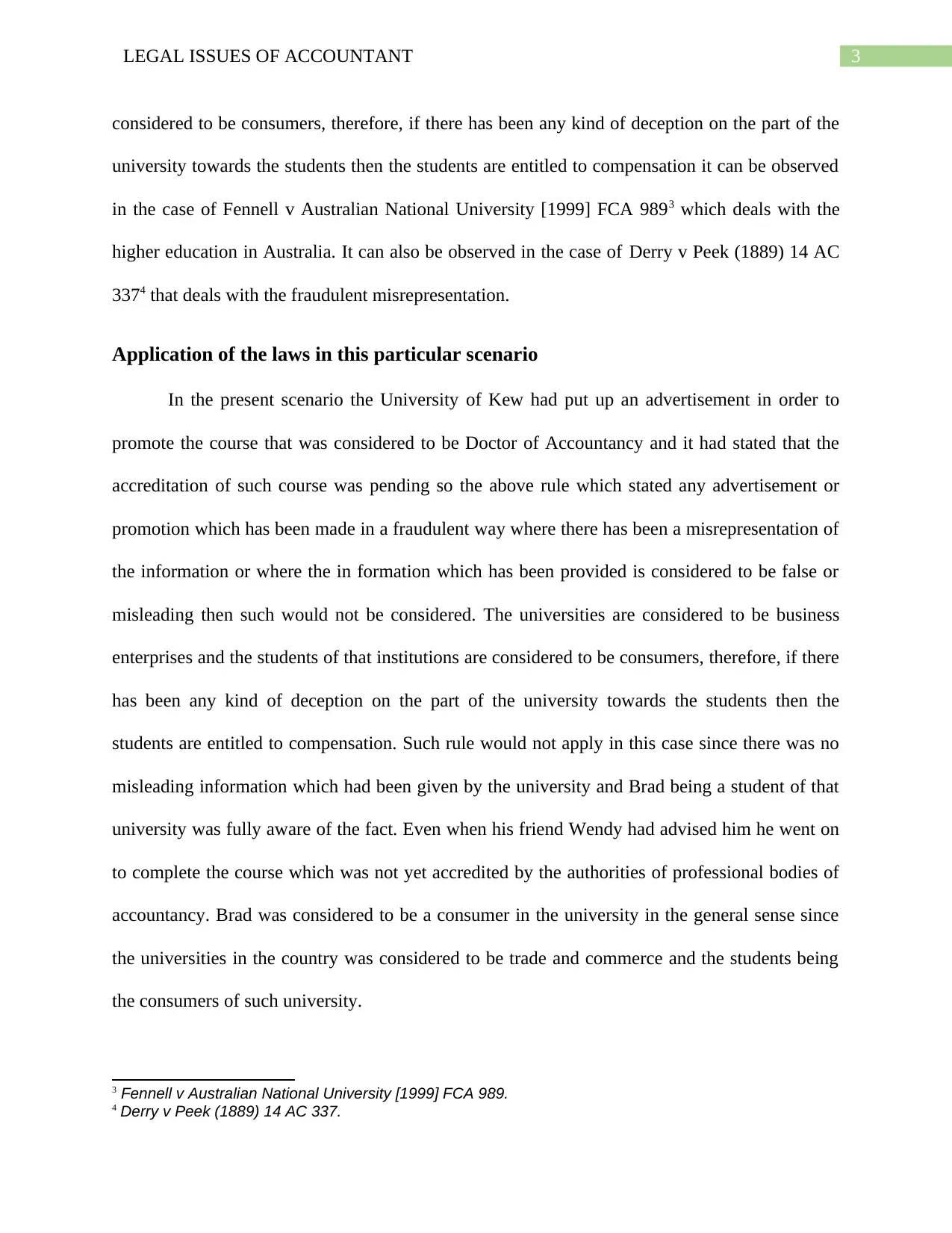
3LEGAL ISSUES OF ACCOUNTANT
considered to be consumers, therefore, if there has been any kind of deception on the part of the
university towards the students then the students are entitled to compensation it can be observed
in the case of Fennell v Australian National University [1999] FCA 9893 which deals with the
higher education in Australia. It can also be observed in the case of Derry v Peek (1889) 14 AC
3374 that deals with the fraudulent misrepresentation.
Application of the laws in this particular scenario
In the present scenario the University of Kew had put up an advertisement in order to
promote the course that was considered to be Doctor of Accountancy and it had stated that the
accreditation of such course was pending so the above rule which stated any advertisement or
promotion which has been made in a fraudulent way where there has been a misrepresentation of
the information or where the in formation which has been provided is considered to be false or
misleading then such would not be considered. The universities are considered to be business
enterprises and the students of that institutions are considered to be consumers, therefore, if there
has been any kind of deception on the part of the university towards the students then the
students are entitled to compensation. Such rule would not apply in this case since there was no
misleading information which had been given by the university and Brad being a student of that
university was fully aware of the fact. Even when his friend Wendy had advised him he went on
to complete the course which was not yet accredited by the authorities of professional bodies of
accountancy. Brad was considered to be a consumer in the university in the general sense since
the universities in the country was considered to be trade and commerce and the students being
the consumers of such university.
3 Fennell v Australian National University [1999] FCA 989.
4 Derry v Peek (1889) 14 AC 337.
considered to be consumers, therefore, if there has been any kind of deception on the part of the
university towards the students then the students are entitled to compensation it can be observed
in the case of Fennell v Australian National University [1999] FCA 9893 which deals with the
higher education in Australia. It can also be observed in the case of Derry v Peek (1889) 14 AC
3374 that deals with the fraudulent misrepresentation.
Application of the laws in this particular scenario
In the present scenario the University of Kew had put up an advertisement in order to
promote the course that was considered to be Doctor of Accountancy and it had stated that the
accreditation of such course was pending so the above rule which stated any advertisement or
promotion which has been made in a fraudulent way where there has been a misrepresentation of
the information or where the in formation which has been provided is considered to be false or
misleading then such would not be considered. The universities are considered to be business
enterprises and the students of that institutions are considered to be consumers, therefore, if there
has been any kind of deception on the part of the university towards the students then the
students are entitled to compensation. Such rule would not apply in this case since there was no
misleading information which had been given by the university and Brad being a student of that
university was fully aware of the fact. Even when his friend Wendy had advised him he went on
to complete the course which was not yet accredited by the authorities of professional bodies of
accountancy. Brad was considered to be a consumer in the university in the general sense since
the universities in the country was considered to be trade and commerce and the students being
the consumers of such university.
3 Fennell v Australian National University [1999] FCA 989.
4 Derry v Peek (1889) 14 AC 337.
Paraphrase This Document
Need a fresh take? Get an instant paraphrase of this document with our AI Paraphraser
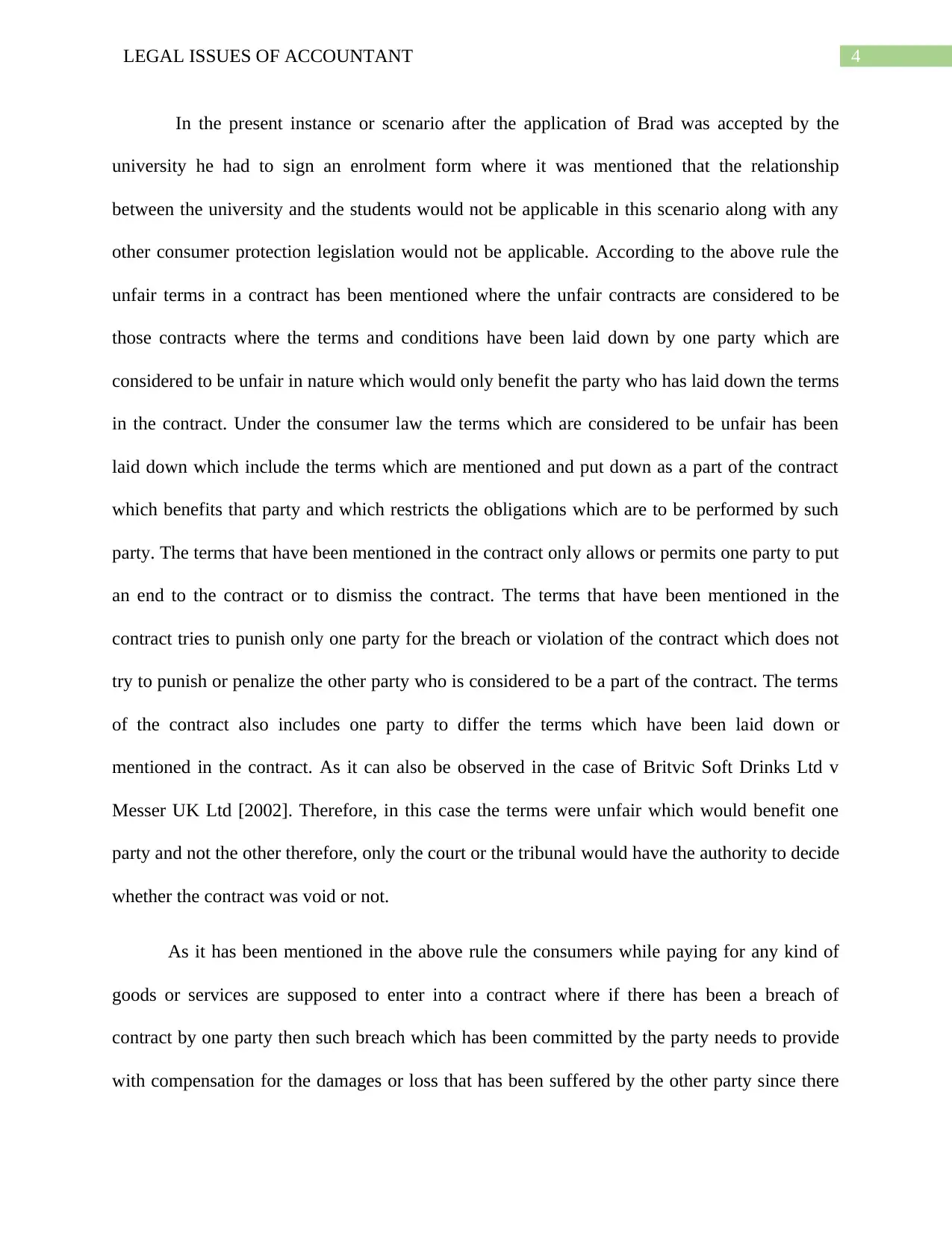
4LEGAL ISSUES OF ACCOUNTANT
In the present instance or scenario after the application of Brad was accepted by the
university he had to sign an enrolment form where it was mentioned that the relationship
between the university and the students would not be applicable in this scenario along with any
other consumer protection legislation would not be applicable. According to the above rule the
unfair terms in a contract has been mentioned where the unfair contracts are considered to be
those contracts where the terms and conditions have been laid down by one party which are
considered to be unfair in nature which would only benefit the party who has laid down the terms
in the contract. Under the consumer law the terms which are considered to be unfair has been
laid down which include the terms which are mentioned and put down as a part of the contract
which benefits that party and which restricts the obligations which are to be performed by such
party. The terms that have been mentioned in the contract only allows or permits one party to put
an end to the contract or to dismiss the contract. The terms that have been mentioned in the
contract tries to punish only one party for the breach or violation of the contract which does not
try to punish or penalize the other party who is considered to be a part of the contract. The terms
of the contract also includes one party to differ the terms which have been laid down or
mentioned in the contract. As it can also be observed in the case of Britvic Soft Drinks Ltd v
Messer UK Ltd [2002]. Therefore, in this case the terms were unfair which would benefit one
party and not the other therefore, only the court or the tribunal would have the authority to decide
whether the contract was void or not.
As it has been mentioned in the above rule the consumers while paying for any kind of
goods or services are supposed to enter into a contract where if there has been a breach of
contract by one party then such breach which has been committed by the party needs to provide
with compensation for the damages or loss that has been suffered by the other party since there
In the present instance or scenario after the application of Brad was accepted by the
university he had to sign an enrolment form where it was mentioned that the relationship
between the university and the students would not be applicable in this scenario along with any
other consumer protection legislation would not be applicable. According to the above rule the
unfair terms in a contract has been mentioned where the unfair contracts are considered to be
those contracts where the terms and conditions have been laid down by one party which are
considered to be unfair in nature which would only benefit the party who has laid down the terms
in the contract. Under the consumer law the terms which are considered to be unfair has been
laid down which include the terms which are mentioned and put down as a part of the contract
which benefits that party and which restricts the obligations which are to be performed by such
party. The terms that have been mentioned in the contract only allows or permits one party to put
an end to the contract or to dismiss the contract. The terms that have been mentioned in the
contract tries to punish only one party for the breach or violation of the contract which does not
try to punish or penalize the other party who is considered to be a part of the contract. The terms
of the contract also includes one party to differ the terms which have been laid down or
mentioned in the contract. As it can also be observed in the case of Britvic Soft Drinks Ltd v
Messer UK Ltd [2002]. Therefore, in this case the terms were unfair which would benefit one
party and not the other therefore, only the court or the tribunal would have the authority to decide
whether the contract was void or not.
As it has been mentioned in the above rule the consumers while paying for any kind of
goods or services are supposed to enter into a contract where if there has been a breach of
contract by one party then such breach which has been committed by the party needs to provide
with compensation for the damages or loss that has been suffered by the other party since there
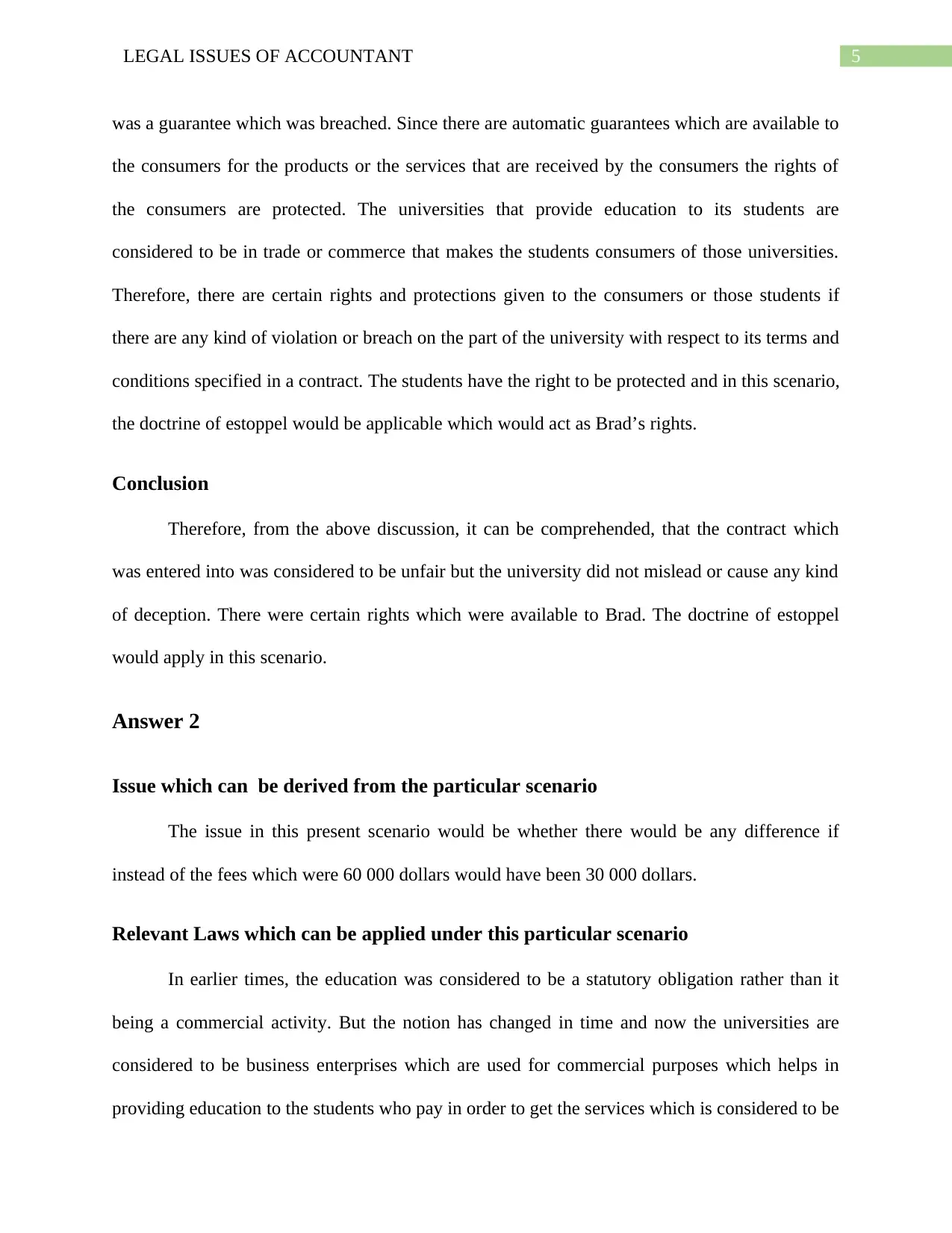
5LEGAL ISSUES OF ACCOUNTANT
was a guarantee which was breached. Since there are automatic guarantees which are available to
the consumers for the products or the services that are received by the consumers the rights of
the consumers are protected. The universities that provide education to its students are
considered to be in trade or commerce that makes the students consumers of those universities.
Therefore, there are certain rights and protections given to the consumers or those students if
there are any kind of violation or breach on the part of the university with respect to its terms and
conditions specified in a contract. The students have the right to be protected and in this scenario,
the doctrine of estoppel would be applicable which would act as Brad’s rights.
Conclusion
Therefore, from the above discussion, it can be comprehended, that the contract which
was entered into was considered to be unfair but the university did not mislead or cause any kind
of deception. There were certain rights which were available to Brad. The doctrine of estoppel
would apply in this scenario.
Answer 2
Issue which can be derived from the particular scenario
The issue in this present scenario would be whether there would be any difference if
instead of the fees which were 60 000 dollars would have been 30 000 dollars.
Relevant Laws which can be applied under this particular scenario
In earlier times, the education was considered to be a statutory obligation rather than it
being a commercial activity. But the notion has changed in time and now the universities are
considered to be business enterprises which are used for commercial purposes which helps in
providing education to the students who pay in order to get the services which is considered to be
was a guarantee which was breached. Since there are automatic guarantees which are available to
the consumers for the products or the services that are received by the consumers the rights of
the consumers are protected. The universities that provide education to its students are
considered to be in trade or commerce that makes the students consumers of those universities.
Therefore, there are certain rights and protections given to the consumers or those students if
there are any kind of violation or breach on the part of the university with respect to its terms and
conditions specified in a contract. The students have the right to be protected and in this scenario,
the doctrine of estoppel would be applicable which would act as Brad’s rights.
Conclusion
Therefore, from the above discussion, it can be comprehended, that the contract which
was entered into was considered to be unfair but the university did not mislead or cause any kind
of deception. There were certain rights which were available to Brad. The doctrine of estoppel
would apply in this scenario.
Answer 2
Issue which can be derived from the particular scenario
The issue in this present scenario would be whether there would be any difference if
instead of the fees which were 60 000 dollars would have been 30 000 dollars.
Relevant Laws which can be applied under this particular scenario
In earlier times, the education was considered to be a statutory obligation rather than it
being a commercial activity. But the notion has changed in time and now the universities are
considered to be business enterprises which are used for commercial purposes which helps in
providing education to the students who pay in order to get the services which is considered to be
⊘ This is a preview!⊘
Do you want full access?
Subscribe today to unlock all pages.

Trusted by 1+ million students worldwide
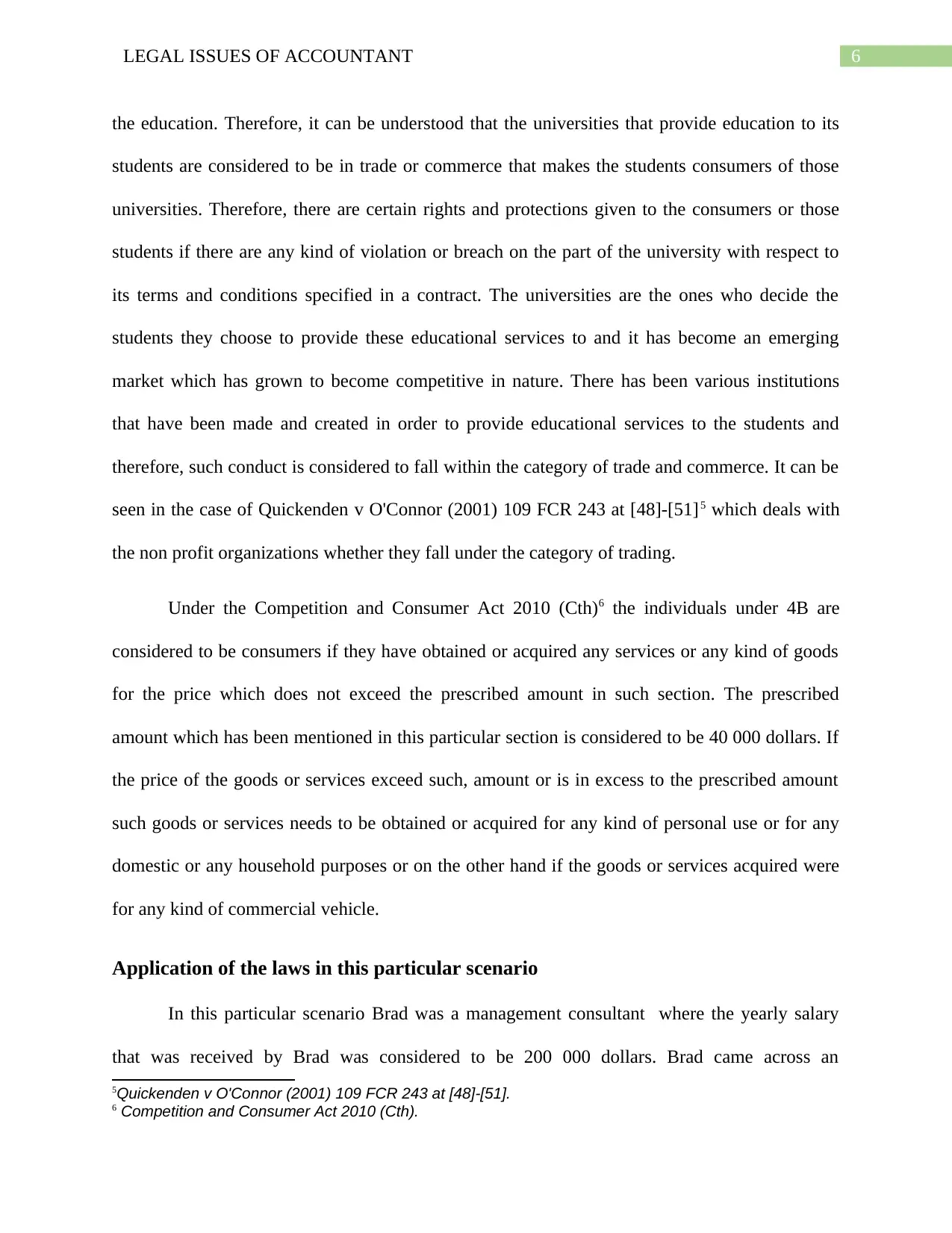
6LEGAL ISSUES OF ACCOUNTANT
the education. Therefore, it can be understood that the universities that provide education to its
students are considered to be in trade or commerce that makes the students consumers of those
universities. Therefore, there are certain rights and protections given to the consumers or those
students if there are any kind of violation or breach on the part of the university with respect to
its terms and conditions specified in a contract. The universities are the ones who decide the
students they choose to provide these educational services to and it has become an emerging
market which has grown to become competitive in nature. There has been various institutions
that have been made and created in order to provide educational services to the students and
therefore, such conduct is considered to fall within the category of trade and commerce. It can be
seen in the case of Quickenden v O'Connor (2001) 109 FCR 243 at [48]-[51]5 which deals with
the non profit organizations whether they fall under the category of trading.
Under the Competition and Consumer Act 2010 (Cth)6 the individuals under 4B are
considered to be consumers if they have obtained or acquired any services or any kind of goods
for the price which does not exceed the prescribed amount in such section. The prescribed
amount which has been mentioned in this particular section is considered to be 40 000 dollars. If
the price of the goods or services exceed such, amount or is in excess to the prescribed amount
such goods or services needs to be obtained or acquired for any kind of personal use or for any
domestic or any household purposes or on the other hand if the goods or services acquired were
for any kind of commercial vehicle.
Application of the laws in this particular scenario
In this particular scenario Brad was a management consultant where the yearly salary
that was received by Brad was considered to be 200 000 dollars. Brad came across an
5Quickenden v O'Connor (2001) 109 FCR 243 at [48]-[51].
6 Competition and Consumer Act 2010 (Cth).
the education. Therefore, it can be understood that the universities that provide education to its
students are considered to be in trade or commerce that makes the students consumers of those
universities. Therefore, there are certain rights and protections given to the consumers or those
students if there are any kind of violation or breach on the part of the university with respect to
its terms and conditions specified in a contract. The universities are the ones who decide the
students they choose to provide these educational services to and it has become an emerging
market which has grown to become competitive in nature. There has been various institutions
that have been made and created in order to provide educational services to the students and
therefore, such conduct is considered to fall within the category of trade and commerce. It can be
seen in the case of Quickenden v O'Connor (2001) 109 FCR 243 at [48]-[51]5 which deals with
the non profit organizations whether they fall under the category of trading.
Under the Competition and Consumer Act 2010 (Cth)6 the individuals under 4B are
considered to be consumers if they have obtained or acquired any services or any kind of goods
for the price which does not exceed the prescribed amount in such section. The prescribed
amount which has been mentioned in this particular section is considered to be 40 000 dollars. If
the price of the goods or services exceed such, amount or is in excess to the prescribed amount
such goods or services needs to be obtained or acquired for any kind of personal use or for any
domestic or any household purposes or on the other hand if the goods or services acquired were
for any kind of commercial vehicle.
Application of the laws in this particular scenario
In this particular scenario Brad was a management consultant where the yearly salary
that was received by Brad was considered to be 200 000 dollars. Brad came across an
5Quickenden v O'Connor (2001) 109 FCR 243 at [48]-[51].
6 Competition and Consumer Act 2010 (Cth).
Paraphrase This Document
Need a fresh take? Get an instant paraphrase of this document with our AI Paraphraser
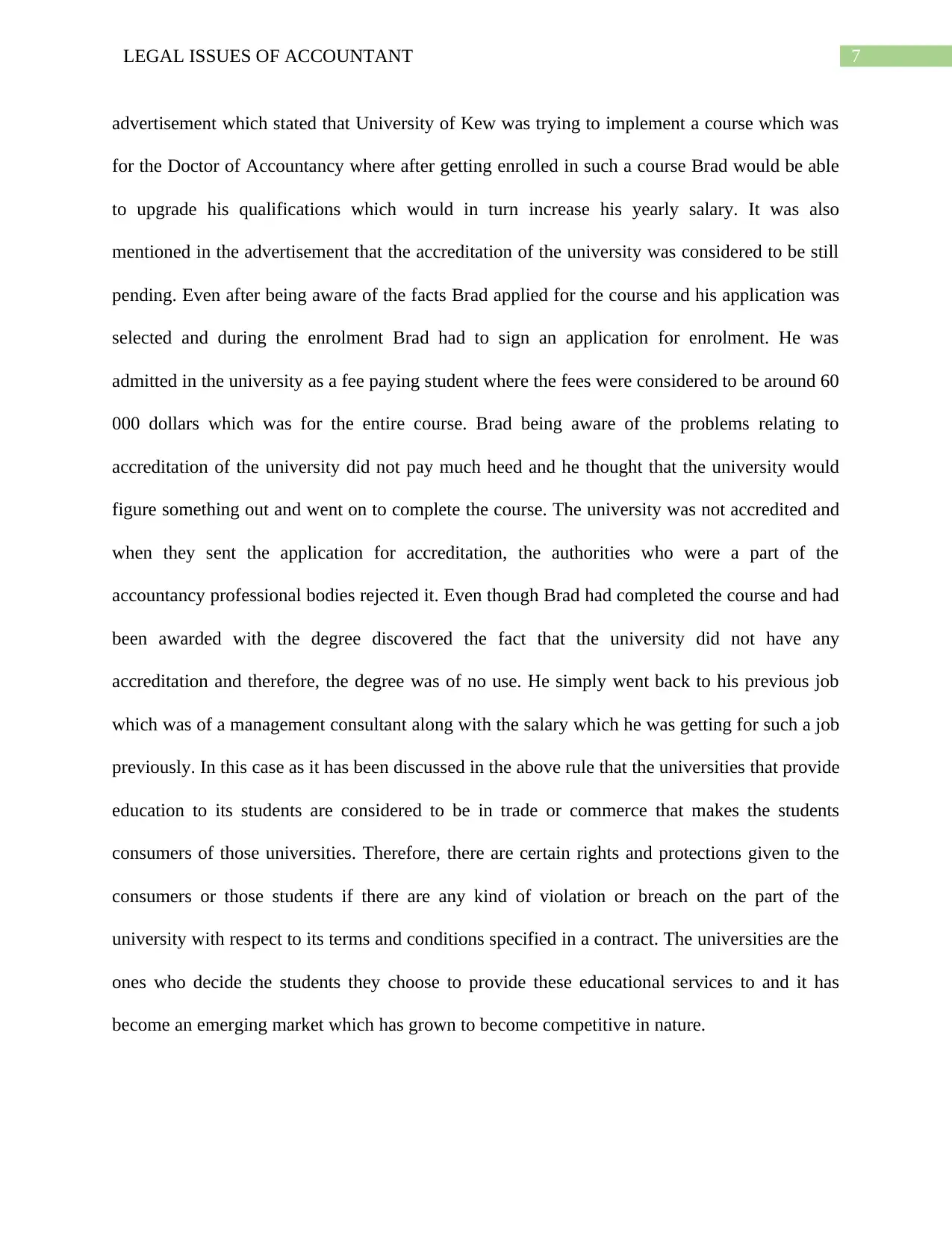
7LEGAL ISSUES OF ACCOUNTANT
advertisement which stated that University of Kew was trying to implement a course which was
for the Doctor of Accountancy where after getting enrolled in such a course Brad would be able
to upgrade his qualifications which would in turn increase his yearly salary. It was also
mentioned in the advertisement that the accreditation of the university was considered to be still
pending. Even after being aware of the facts Brad applied for the course and his application was
selected and during the enrolment Brad had to sign an application for enrolment. He was
admitted in the university as a fee paying student where the fees were considered to be around 60
000 dollars which was for the entire course. Brad being aware of the problems relating to
accreditation of the university did not pay much heed and he thought that the university would
figure something out and went on to complete the course. The university was not accredited and
when they sent the application for accreditation, the authorities who were a part of the
accountancy professional bodies rejected it. Even though Brad had completed the course and had
been awarded with the degree discovered the fact that the university did not have any
accreditation and therefore, the degree was of no use. He simply went back to his previous job
which was of a management consultant along with the salary which he was getting for such a job
previously. In this case as it has been discussed in the above rule that the universities that provide
education to its students are considered to be in trade or commerce that makes the students
consumers of those universities. Therefore, there are certain rights and protections given to the
consumers or those students if there are any kind of violation or breach on the part of the
university with respect to its terms and conditions specified in a contract. The universities are the
ones who decide the students they choose to provide these educational services to and it has
become an emerging market which has grown to become competitive in nature.
advertisement which stated that University of Kew was trying to implement a course which was
for the Doctor of Accountancy where after getting enrolled in such a course Brad would be able
to upgrade his qualifications which would in turn increase his yearly salary. It was also
mentioned in the advertisement that the accreditation of the university was considered to be still
pending. Even after being aware of the facts Brad applied for the course and his application was
selected and during the enrolment Brad had to sign an application for enrolment. He was
admitted in the university as a fee paying student where the fees were considered to be around 60
000 dollars which was for the entire course. Brad being aware of the problems relating to
accreditation of the university did not pay much heed and he thought that the university would
figure something out and went on to complete the course. The university was not accredited and
when they sent the application for accreditation, the authorities who were a part of the
accountancy professional bodies rejected it. Even though Brad had completed the course and had
been awarded with the degree discovered the fact that the university did not have any
accreditation and therefore, the degree was of no use. He simply went back to his previous job
which was of a management consultant along with the salary which he was getting for such a job
previously. In this case as it has been discussed in the above rule that the universities that provide
education to its students are considered to be in trade or commerce that makes the students
consumers of those universities. Therefore, there are certain rights and protections given to the
consumers or those students if there are any kind of violation or breach on the part of the
university with respect to its terms and conditions specified in a contract. The universities are the
ones who decide the students they choose to provide these educational services to and it has
become an emerging market which has grown to become competitive in nature.
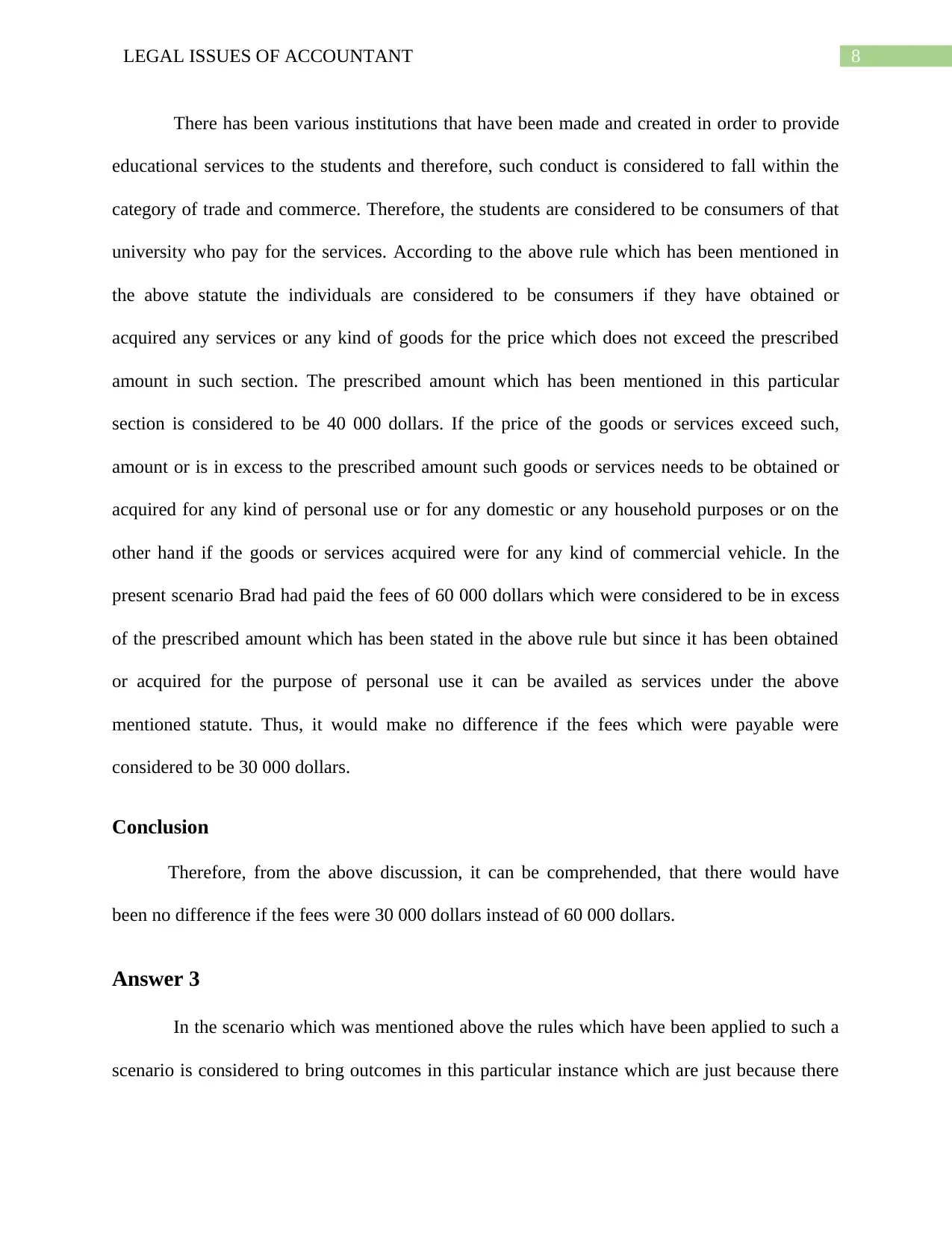
8LEGAL ISSUES OF ACCOUNTANT
There has been various institutions that have been made and created in order to provide
educational services to the students and therefore, such conduct is considered to fall within the
category of trade and commerce. Therefore, the students are considered to be consumers of that
university who pay for the services. According to the above rule which has been mentioned in
the above statute the individuals are considered to be consumers if they have obtained or
acquired any services or any kind of goods for the price which does not exceed the prescribed
amount in such section. The prescribed amount which has been mentioned in this particular
section is considered to be 40 000 dollars. If the price of the goods or services exceed such,
amount or is in excess to the prescribed amount such goods or services needs to be obtained or
acquired for any kind of personal use or for any domestic or any household purposes or on the
other hand if the goods or services acquired were for any kind of commercial vehicle. In the
present scenario Brad had paid the fees of 60 000 dollars which were considered to be in excess
of the prescribed amount which has been stated in the above rule but since it has been obtained
or acquired for the purpose of personal use it can be availed as services under the above
mentioned statute. Thus, it would make no difference if the fees which were payable were
considered to be 30 000 dollars.
Conclusion
Therefore, from the above discussion, it can be comprehended, that there would have
been no difference if the fees were 30 000 dollars instead of 60 000 dollars.
Answer 3
In the scenario which was mentioned above the rules which have been applied to such a
scenario is considered to bring outcomes in this particular instance which are just because there
There has been various institutions that have been made and created in order to provide
educational services to the students and therefore, such conduct is considered to fall within the
category of trade and commerce. Therefore, the students are considered to be consumers of that
university who pay for the services. According to the above rule which has been mentioned in
the above statute the individuals are considered to be consumers if they have obtained or
acquired any services or any kind of goods for the price which does not exceed the prescribed
amount in such section. The prescribed amount which has been mentioned in this particular
section is considered to be 40 000 dollars. If the price of the goods or services exceed such,
amount or is in excess to the prescribed amount such goods or services needs to be obtained or
acquired for any kind of personal use or for any domestic or any household purposes or on the
other hand if the goods or services acquired were for any kind of commercial vehicle. In the
present scenario Brad had paid the fees of 60 000 dollars which were considered to be in excess
of the prescribed amount which has been stated in the above rule but since it has been obtained
or acquired for the purpose of personal use it can be availed as services under the above
mentioned statute. Thus, it would make no difference if the fees which were payable were
considered to be 30 000 dollars.
Conclusion
Therefore, from the above discussion, it can be comprehended, that there would have
been no difference if the fees were 30 000 dollars instead of 60 000 dollars.
Answer 3
In the scenario which was mentioned above the rules which have been applied to such a
scenario is considered to bring outcomes in this particular instance which are just because there
⊘ This is a preview!⊘
Do you want full access?
Subscribe today to unlock all pages.

Trusted by 1+ million students worldwide
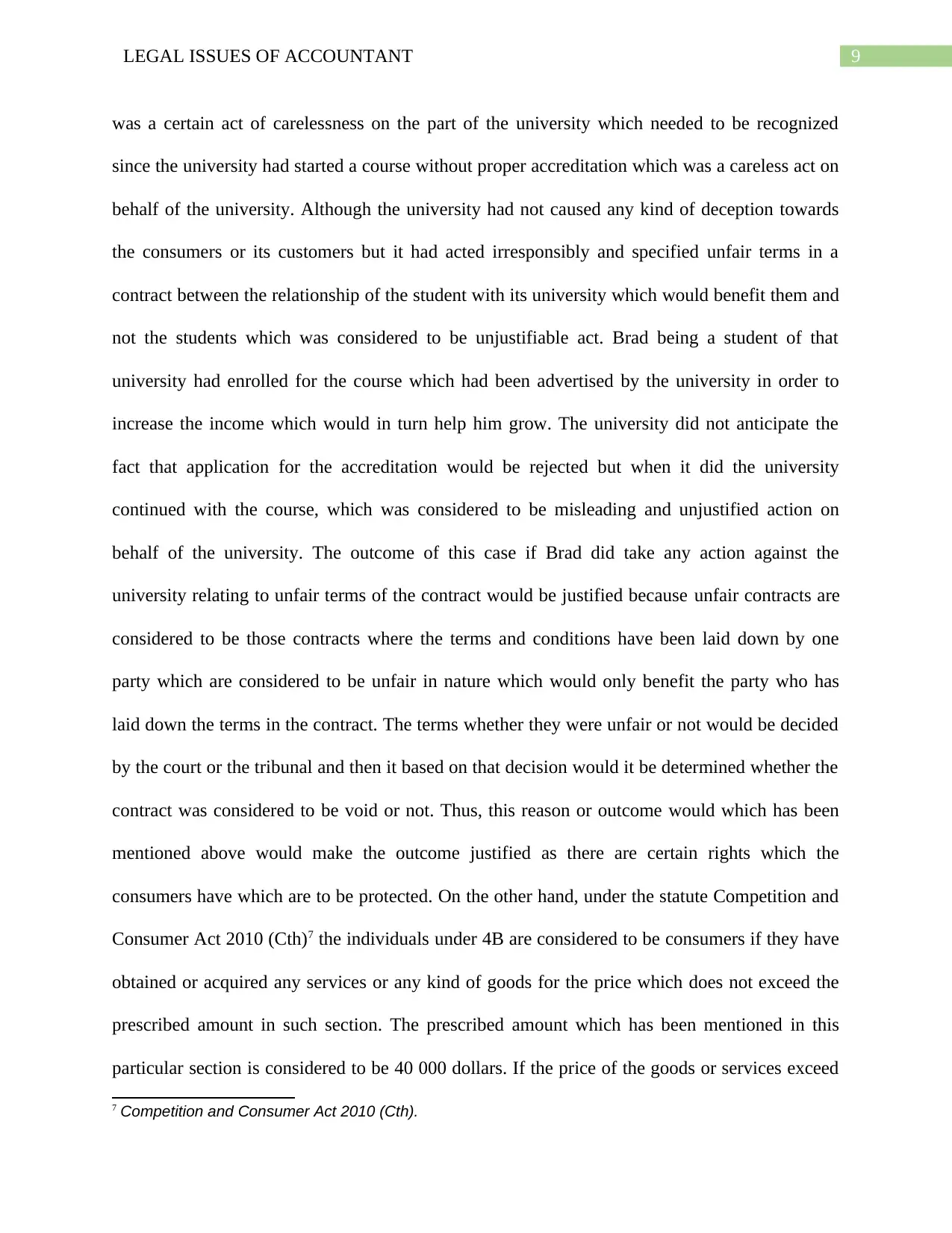
9LEGAL ISSUES OF ACCOUNTANT
was a certain act of carelessness on the part of the university which needed to be recognized
since the university had started a course without proper accreditation which was a careless act on
behalf of the university. Although the university had not caused any kind of deception towards
the consumers or its customers but it had acted irresponsibly and specified unfair terms in a
contract between the relationship of the student with its university which would benefit them and
not the students which was considered to be unjustifiable act. Brad being a student of that
university had enrolled for the course which had been advertised by the university in order to
increase the income which would in turn help him grow. The university did not anticipate the
fact that application for the accreditation would be rejected but when it did the university
continued with the course, which was considered to be misleading and unjustified action on
behalf of the university. The outcome of this case if Brad did take any action against the
university relating to unfair terms of the contract would be justified because unfair contracts are
considered to be those contracts where the terms and conditions have been laid down by one
party which are considered to be unfair in nature which would only benefit the party who has
laid down the terms in the contract. The terms whether they were unfair or not would be decided
by the court or the tribunal and then it based on that decision would it be determined whether the
contract was considered to be void or not. Thus, this reason or outcome would which has been
mentioned above would make the outcome justified as there are certain rights which the
consumers have which are to be protected. On the other hand, under the statute Competition and
Consumer Act 2010 (Cth)7 the individuals under 4B are considered to be consumers if they have
obtained or acquired any services or any kind of goods for the price which does not exceed the
prescribed amount in such section. The prescribed amount which has been mentioned in this
particular section is considered to be 40 000 dollars. If the price of the goods or services exceed
7 Competition and Consumer Act 2010 (Cth).
was a certain act of carelessness on the part of the university which needed to be recognized
since the university had started a course without proper accreditation which was a careless act on
behalf of the university. Although the university had not caused any kind of deception towards
the consumers or its customers but it had acted irresponsibly and specified unfair terms in a
contract between the relationship of the student with its university which would benefit them and
not the students which was considered to be unjustifiable act. Brad being a student of that
university had enrolled for the course which had been advertised by the university in order to
increase the income which would in turn help him grow. The university did not anticipate the
fact that application for the accreditation would be rejected but when it did the university
continued with the course, which was considered to be misleading and unjustified action on
behalf of the university. The outcome of this case if Brad did take any action against the
university relating to unfair terms of the contract would be justified because unfair contracts are
considered to be those contracts where the terms and conditions have been laid down by one
party which are considered to be unfair in nature which would only benefit the party who has
laid down the terms in the contract. The terms whether they were unfair or not would be decided
by the court or the tribunal and then it based on that decision would it be determined whether the
contract was considered to be void or not. Thus, this reason or outcome would which has been
mentioned above would make the outcome justified as there are certain rights which the
consumers have which are to be protected. On the other hand, under the statute Competition and
Consumer Act 2010 (Cth)7 the individuals under 4B are considered to be consumers if they have
obtained or acquired any services or any kind of goods for the price which does not exceed the
prescribed amount in such section. The prescribed amount which has been mentioned in this
particular section is considered to be 40 000 dollars. If the price of the goods or services exceed
7 Competition and Consumer Act 2010 (Cth).
Paraphrase This Document
Need a fresh take? Get an instant paraphrase of this document with our AI Paraphraser
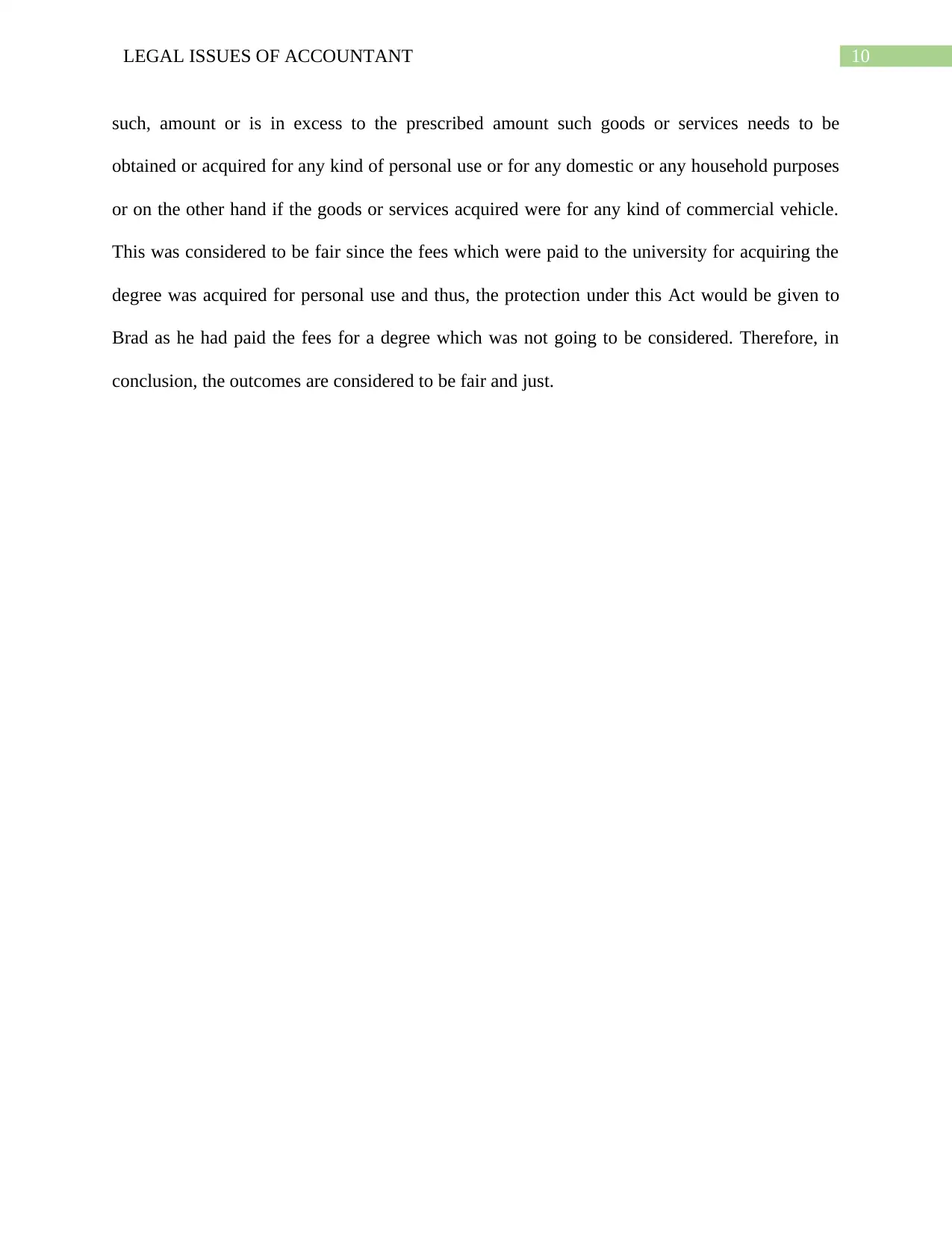
10LEGAL ISSUES OF ACCOUNTANT
such, amount or is in excess to the prescribed amount such goods or services needs to be
obtained or acquired for any kind of personal use or for any domestic or any household purposes
or on the other hand if the goods or services acquired were for any kind of commercial vehicle.
This was considered to be fair since the fees which were paid to the university for acquiring the
degree was acquired for personal use and thus, the protection under this Act would be given to
Brad as he had paid the fees for a degree which was not going to be considered. Therefore, in
conclusion, the outcomes are considered to be fair and just.
such, amount or is in excess to the prescribed amount such goods or services needs to be
obtained or acquired for any kind of personal use or for any domestic or any household purposes
or on the other hand if the goods or services acquired were for any kind of commercial vehicle.
This was considered to be fair since the fees which were paid to the university for acquiring the
degree was acquired for personal use and thus, the protection under this Act would be given to
Brad as he had paid the fees for a degree which was not going to be considered. Therefore, in
conclusion, the outcomes are considered to be fair and just.
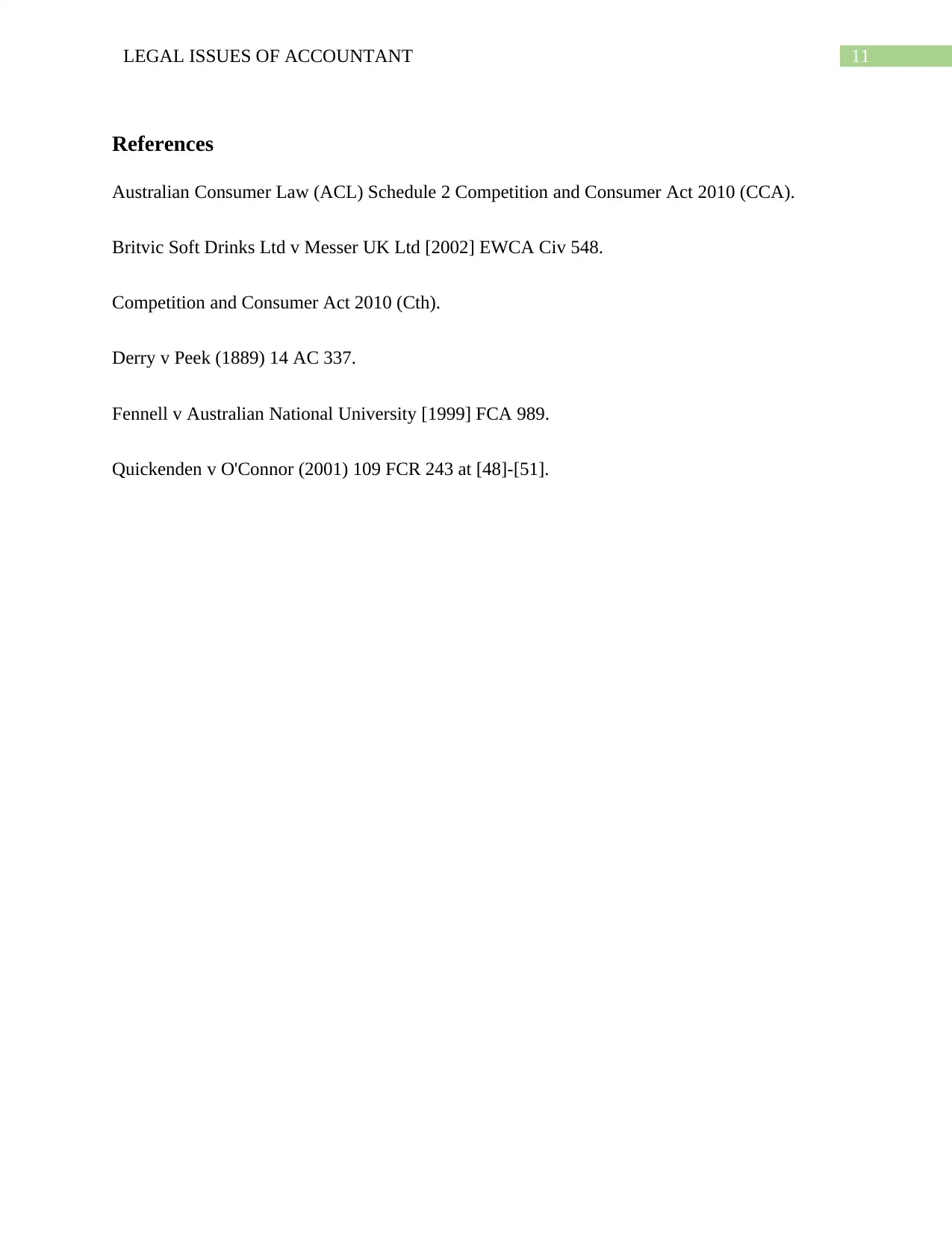
11LEGAL ISSUES OF ACCOUNTANT
References
Australian Consumer Law (ACL) Schedule 2 Competition and Consumer Act 2010 (CCA).
Britvic Soft Drinks Ltd v Messer UK Ltd [2002] EWCA Civ 548.
Competition and Consumer Act 2010 (Cth).
Derry v Peek (1889) 14 AC 337.
Fennell v Australian National University [1999] FCA 989.
Quickenden v O'Connor (2001) 109 FCR 243 at [48]-[51].
References
Australian Consumer Law (ACL) Schedule 2 Competition and Consumer Act 2010 (CCA).
Britvic Soft Drinks Ltd v Messer UK Ltd [2002] EWCA Civ 548.
Competition and Consumer Act 2010 (Cth).
Derry v Peek (1889) 14 AC 337.
Fennell v Australian National University [1999] FCA 989.
Quickenden v O'Connor (2001) 109 FCR 243 at [48]-[51].
⊘ This is a preview!⊘
Do you want full access?
Subscribe today to unlock all pages.

Trusted by 1+ million students worldwide
1 out of 12
Related Documents
Your All-in-One AI-Powered Toolkit for Academic Success.
+13062052269
info@desklib.com
Available 24*7 on WhatsApp / Email
![[object Object]](/_next/static/media/star-bottom.7253800d.svg)
Unlock your academic potential
Copyright © 2020–2025 A2Z Services. All Rights Reserved. Developed and managed by ZUCOL.




